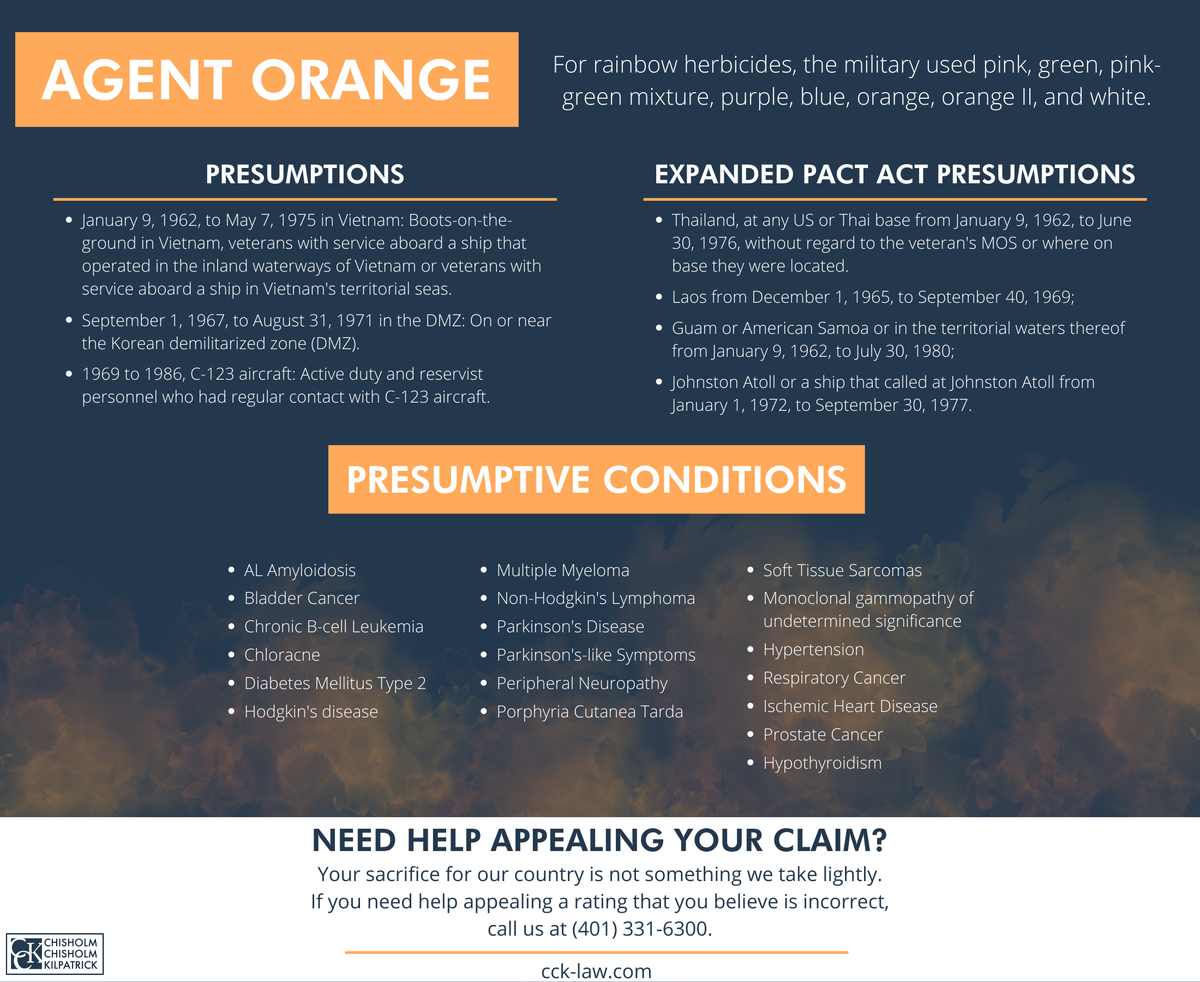Agent Orange and Kidney Disease

CCK Law: Our Vital Role in Veterans Law
Agent Orange Overview
Agent Orange is one of several “rainbow” herbicides used by the United States during the Vietnam War era. The United States military used Agent Orange and other herbicides to deforest large areas of land in Vietnam, and to disrupt enemy supply lines and prevent ambushes. As such, many veterans who served during the Vietnam War era were in direct contact with Agent Orange.
Specifically, Agent Orange is a 50/50 mixture of two kinds of herbicide agents: 2,4-D and 2,4,5-T. Agent Orange also contained 2, 3, 7, 8-TCDD, a byproduct of its production, which is the most toxic of all dioxins. This dioxin often takes years to break down once it has been released into the environment and can cause a wide array of health effects. Thus, many Vietnam-era veterans have developed serious health conditions due to Agent Orange exposure.

Agent Orange Presumptive Conditions
The Department of Veterans Affairs (VA) recognizes certain conditions and their symptoms as having a strong association with Agent Orange exposure. The following Agent Orange side effects are considered presumptive by VA:
- Hypothyroidism
- Ischemic heart disease
- Multiple myeloma
- Monoclonal gammopathy of undetermined significance
- Non-Hodgkin’s lymphoma
- Parkinson’s disease
- Parkinson’s-like symptoms
- Peripheral neuropathy
- Porphyria cutanea tarda
- Prostate cancer
- Respiratory Cancer
- Soft Tissue Sarcomas
Agent Orange Presumption of Exposure
The PACT Act, which was signed into law in August 2022, extended VA benefits to millions of service members, including Vietnam-era veterans. Specifically, the Act expanded presumptions for herbicide exposure for veterans with active military, naval, air, or space service in:
- The Republic of Vietnam from January 9, 1962 to May 7, 1975;
- Korean Demilitarized Zone or nearby between September 1, 1967 and August 31, 1971;
- Thailand, at any US or Thai base, from January 9, 1962 to June 30 1976, without regard to the Veteran’s MOS or where on base they were located;
- Laos from December 1, 1965 to September 30, 1969;
- Cambodia, specifically at Mimot or Krek, Kampong Cham Province from April 16, 1969 to April 30, 1969;
- Guam or American Samoa or in the territorial waters thereof from January 9, 1962 to July 30, 1980;
- Johnson Atoll or a ship that called at Johnston Atoll from January 1, 1972 to September 30, 1977;
- Active duty and reservist personnel who had regular contact with C-123 aircraft between 1969 and 1986.
What Is Kidney Disease?
Kidney disease is a blanket term for several types of conditions in which the kidney gradually loses function. These conditions occur when damage to the kidneys impacts the body’s ability to regulate blood pressure and filter waste, leading to serious health problems.
Types of Kidney Disease
There are several types of conditions that affect the kidney, including:
- Acute kidney failure – Acute kidney failure can occur when the kidneys become unable to filter the blood in the body, leading to high levels of waste accumulating in the blood. Complications that accompany acute kidney failure include chest pain, muscle weakness, permanent kidney damage, and even death.
- Diabetic nephropathy – Diabetic nephropathy, also known as diabetic kidney disease, is most often a complication of type 1 and type 2 diabetes. Diabetes can damage blood vessel clusters in the kidneys, limiting the kidneys’ ability to filter water from the blood.
- Chronic kidney disease – Chronic kidney disease refers to the gradual loss of use of the kidneys. This essentially means that the kidneys can no longer filter waste from the blood and body as they should. It often occurs when another condition damages the kidneys over time.
- End-stage renal failure – End-stage renal failure, or end-stage kidney disease, occurs when chronic kidney disease reaches an advanced stage. The gradual loss of kidney function has progressed to the point where the kidneys can no longer function to meet the body’s needs. A person with end-stage renal failure will generally need dialysis or a kidney transplant to survive.
VA Ratings for Kidney Disease
The Department of Veterans Affairs (VA) rates kidney disease under the 38 CFR § 4.115a, Ratings of the Genitourinary System – Dysfunctions, using the criteria for renal dysfunction. The criteria for each rating are as follows:
- 100 percent – “Chronic kidney disease with glomerular filtration rate (GFR) less than 15 mL/min/1.73 m 2 for at least 3 consecutive months during the past 12 months; or requiring regular routine dialysis; or eligible kidney transplant recipient.”
- 80 percent – “Chronic kidney disease with GFR from 15 to 29 mL/min/1.73 m 2 for at least 3 consecutive months during the past 12 months.”
- 60 percent – “Chronic kidney disease with GFR from 30 to 44 mL/min/1.73 m 2 for at least 3 consecutive months during the past 12 months.”
- 30 percent – “Chronic kidney disease with GFR from 45 to 59 mL/min/1.73 m 2 for at least 3 consecutive months during the past 12 months.”
- 0 percent – “GFR from 60 to 89 mL/min/1.73 m 2 and either recurrent red blood cell (RBC) casts, white blood cell (WBC) casts, or granular casts for at least 3 consecutive months during the past 12 months; OR GFR from 60 to 89 mL/min/1.73 m 2 and structural kidney abnormalities (cystic, obstructive, or glomerular) for at least 3 consecutive months during the past 12 months; OR GFR from 60 to 89 mL/min/1.73 m 2 and albumin/creatinine ratio (ACR) ≥30 mg/g for at least 3 consecutive months during the past 12 months.”
Essentially, veterans with stage 3 chronic kidney disease (i.e., moderate kidney damage, a GFR between 30 and 59) are typically assigned a 30 or 60 percent rating; veterans with stage 4 chronic kidney disease (i.e., severely reduced kidney function, a GFR of 15 to 29) are rated at 80 percent; and veterans with end-stage renal failure are generally assigned a 100 percent disability rating. Veterans with stage 1 or 2 kidney disease will most likely receive a 0 percent noncompensable rating.

Agent Orange Effects on Kidneys and Veterans
According to the Department of Veterans Affairs (VA), the rate of kidney disease is estimated to be 34 percent higher in the veteran population than in the general population. This may be due to the prevalence of type 2 diabetes and hypertension (i.e., high blood pressure) among veterans, which are some of the leading risk factors for kidney disease.
Although kidney disease and renal failure are not included on VA’s list of Agent Orange presumptive conditions, there is evidence linking kidney conditions to herbicide exposure.
In a 2016 Board of Veterans’ Appeals decision, the Board granted service connection for several kidney disabilities, including chronic kidney disease, related to Agent Orange herbicide exposure. This decision was partially based on a medical opinion that stated that “the Agent Orange contaminant dioxin was associated with chronic kidney disease and was an independent risk factor for chronic kidney disease in an endemic area of exposure.”
Service Connection for Agent Orange Kidney Disease
Generally, to receive VA benefits for an Agent Orange-related condition, veterans must have evidence of the following:
- A medical diagnosis of a presumptive condition; and
- Evidence of active-duty military service in a qualifying location for Agent Orange exposure, as detailed above.
Veterans exposed to Agent Orange who later develop kidney disease may be eligible for VA disability compensation. While kidney disease may not yet be considered presumptive by VA, you can still qualify for disability compensation on a direct basis. To prove service connection for Agent Orange on a direct basis, you will need additional evidence to support your case:
- A current diagnosis of kidney disease by a medical professional; and
- A medical nexus, or link, between Agent Orange exposure and kidney disease.
Establishing a link between Agent Orange and kidney disease usually requires an opinion from a medical professional or a favorable Compensation and Pension (C&P) exam. The nexus opinion should state whether your kidney disease is “at least as likely as not” related to Agent Orange exposure.
Secondary Service Connection for Kidney Disease
Veterans who developed kidney disease due to another service-connected Agent Orange condition, such as diabetes mellitus type 2 or prostate cancer, may be eligible for kidney disease service connection on a secondary basis.
To establish secondary service connection for kidney disease, veterans must have evidence of the following:
- A current diagnosis of kidney disease; and
- A medical nexus, or link, showing the relationship between the Agent Orange condition and kidney disease.
If secondary service connection is awarded, VA will assign a disability rating to the kidney condition.

Kidney Disease Secondary to Type 2 Diabetes
According to the National Kidney Foundation, type 2 diabetes is one of the leading causes of kidney disease. Specifically, 10 to 40 percent of individuals with type 2 diabetes will eventually suffer from kidney failure. The National Institute of Diabetes and Digestive and Kidney Diseases also estimates that type 2 diabetes is the leading cause of chronic kidney disease and kidney failure, accounting for nearly 44 percent of cases.
If you develop a kidney condition in connection to your Agent Orange-related diabetes, you can file a VA disability claim for kidney disease secondary to type 2 diabetes.
Was Your Kidney Disease VA Claim Denied?
Despite evidence linking kidney disease to Agent Orange exposure, VA often denies Agent Orange kidney disease claims. If you are a Vietnam War era veteran and your VA disability claim for kidney disease was denied, Chisholm Chisholm & Kilpatrick LTD may be able to help. The accredited attorneys and claims agents at CCK have decades of collective experience representing veterans affected by Agent Orange before VA, the Board of Veterans’ Appeals, and the Court of Appeals for Veterans Claims (CAVC).
We may be able to help you secure the VA compensation you deserve. Call CCK today at 800-544-9144 for a free case review with a member of our team.
About the Author
Share this Post
